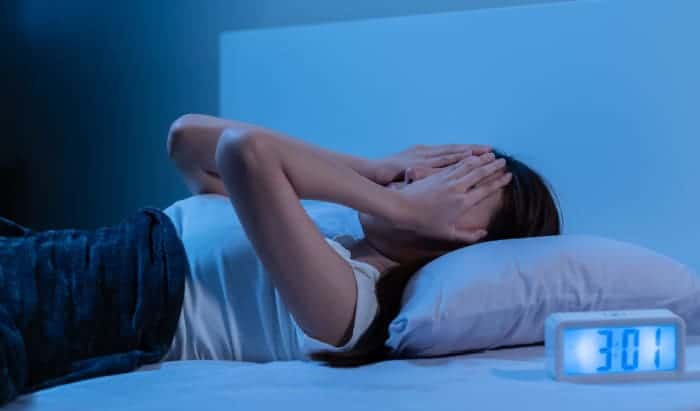New research reveals that as many as eight in ten women, who are experiencing interrupted sleep during their period, are waking up to five times a night due to discomfort and worrying about period leaks.
In a bid to get a good night’s sleep, that’s leak-free, 85% of women are resorting to so called ‘period hacks’ yet this leaves them uncomfortable and susceptible to a ‘period hangover’ the next day
Silentnight’s Sleep Expert, Hannah Shore, is providing women with helpful tips to change the night (not the sheets) and reclaim a night of uninterrupted sleep
Three quarters of women (75%) in the UK experience a more interrupted night’s sleep when they’re on their period compared to any other time of the month. As many as 80%1 of those experiencing interrupted sleep are waking up to 5 times a night when on their period, spending up to 30 minutes awake at a time (71%). When asked what’s causing these ‘period wakeups’, 38%1 said it’s because they’re worried about period leaks, getting up to change their period protection (30%) or general discomfort when lying down (25%).
With 41% of women saying that getting a good night’s sleep is more important to them when they’re on their period than at any other time of their menstrual cycle, it’s no surprise that as many as 85% admit to trying “period hacks” to avoid leaks and get a better night’s sleep. The so-called ‘hacks’ include wearing multiple pads (22%2) and even sleeping on towels (20%1).
New research by Always reveals the impact of a bad night’s sleep is also felt the next day with 68%2 of women admitting they feel more irritable and 51%1 unable to concentrate. And almost half (47%1) said it takes them between a few days and a week to catch up on sleep following their period. Half of those surveyed (50%1) also feel there isn’t enough awareness about the impact menstruation has on their sleep quality.
So, with the period hangover caused by poor sleep while on your period being all too real, Always is stepping in to help women in the UK reclaim a night of uninterrupted sleep during their period with the launch of its new Always Ultra Size 6 night pads. It’s their longest, widest pad yet, specifically designed to help prevent leaks at night and comes with extra wings at the back of the pad to keep it in place during the night. In addition to their new product offering, Always has joined forces with Silentnight’s in-house Sleep Expert, Hannah Shore, to share her advice for getting a better night sleep while on your period. As the UK’s most trusted sleep brand, they too believe everyone should access quality sleep each night, regardless of being on their period or not.
Hannah says; “Not getting enough sleep can have a profound effect not just emotionally, but physically too. In fact, the less sleep we get, the more our pain tolerance decreases, meaning the worse our sleep gets and the worse our cramps are likely to get. That’s why we wanted to partner with Always to empower women to reclaim a night of uninterrupted sleep and share my top tips to help.”
Top Tips to avoid the period hangover
- Regulate your temperature
- Our bodies run hot during our periods, and when we are asleep our core body temperature needs to drop a couple of degrees to get access to the good quality sleep we need. Avoid hot showers/baths. (warm is ok and can be relaxing) or exercise before bed and wear light, cool pyjamas. If you struggle with overheating throughout the night regularly try avoiding things like memory foam mattresses, as these can hold onto heat and make you hotter. A cold damp flannel or cold glass of water can help on particularly bad nights.
- Establish a sleep routine
- Routine is key when it comes to sleep. We should be going to sleep and waking up every day at the same time, even on weekends. This means our bodies will be used to producing the right hormones at the right time of day (sleep hormones such as melatonin in the evening and wake promoting hormones such as cortisol for the day). Producing the right hormones at the right time means we will fall asleep easier and wake up easier, leaving us feeling more refreshed.
- Light
- Light is important when it comes to sleep; we sleep when its dark for a reason. Light is our main external cue that regulates our sleep/wake hormone production. Bright morning light suppresses the sleep hormones leaving you feeling more awake. Dull, darker evening light prompts the body to produce sleep hormones such as melatonin which will help you drift off to sleep easier.
- Keep pain relief to hand
- Getting up to seek out pain relief (turning on the lights to do so) will disturb your sleep cycle and make you feel more awake. Keep pain relief next to your bed or in an easily accessible place. If you experience very painful periods, it is recommended that you speak to your GP.
- Find a period product that works for you
- Sleeping on towels or using multiple period products can increase body temperature and add to your discomfort. Having a period product that works for you / you feel confident in will not only make you feel more comfortable but also reduce stress and worry. Stress and worry are sleep’s worst enemy; they produce wake promoting hormones, which when they are in the system, will cause us to struggle to get to and stay asleep.
The new Always Ultra Size 6 night pad is designed with 3x the absorbency of Always Ultra Size 1 and extra wings at the back, to lock the pad in place for those night-time fidgeters, to protect against night-time leaks for an extra peaceful night’s sleep.
Farah Azmy, Brand Director for Always UK says: ‘’We’ve all experienced period leaks during restless nights and had to deal with the period hangover the next morning. Sleep is so important, but even more so during your period when your body needs the rest. It’s become evident that there is a growing need for a solution like Always Ultra Size 6 to help relieve over-night worries instead of managing with complex and uncomfortable period hacks.’’
- No Mind Left Behind: Support the Carers - 4th May 2025
- Climate change causes longer pollen seasons in capital cities - 4th May 2025
- The Hidden Toll of Caregiving on Joint Health and Well-being - 3rd May 2025


